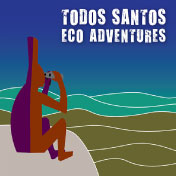by Bryan Jáuregui, Todos Santos Eco Adventures
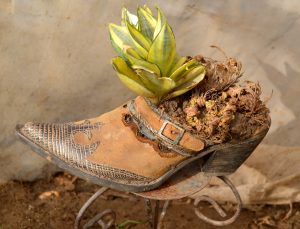 When you arrive at Areli Sarah Castillo’s house in Pescadero on a late summer afternoon, the look and feel of the front of her house is very similar to that of her neighbors: there’s a teenage boy working on his truck in beat to the radio’s tunes; two young girls are playing with dolls on the sofa under a well-placed beach umbrella; and several dogs are enjoying afternoon napping bliss in various poses. There’s nothing to suggest that the Castillo family is at the forefront of a movement to change the eating and health patterns of a town – until you go around back. There you find the riot of green and rampant plant life that is the greenhouse built by Areli and her children, and from which they feed the twelve people who now call their house home. Beautiful long vines of tomatoes, steamy-looking chiles, delightfully prickly pineapples, all manner of herbs and spices, all lovingly cared for in a space next to the chicken coop where the happy, well-cared for hens oblige the family with at least 15 eggs a day. All healthy, all organic, all the time. It’s not really what you’d expect from a woman who used to sell hotdogs for a living.
When you arrive at Areli Sarah Castillo’s house in Pescadero on a late summer afternoon, the look and feel of the front of her house is very similar to that of her neighbors: there’s a teenage boy working on his truck in beat to the radio’s tunes; two young girls are playing with dolls on the sofa under a well-placed beach umbrella; and several dogs are enjoying afternoon napping bliss in various poses. There’s nothing to suggest that the Castillo family is at the forefront of a movement to change the eating and health patterns of a town – until you go around back. There you find the riot of green and rampant plant life that is the greenhouse built by Areli and her children, and from which they feed the twelve people who now call their house home. Beautiful long vines of tomatoes, steamy-looking chiles, delightfully prickly pineapples, all manner of herbs and spices, all lovingly cared for in a space next to the chicken coop where the happy, well-cared for hens oblige the family with at least 15 eggs a day. All healthy, all organic, all the time. It’s not really what you’d expect from a woman who used to sell hotdogs for a living.
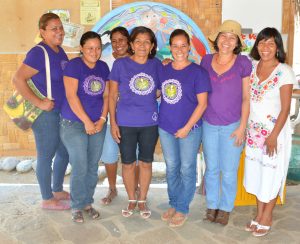
Greenhouse Greats of Pescadero
Areli is one of 18 women in the Sistemas Naturales y Desarrollo AC (SINADES) greenhouse program in Pescadero run by Inés Melchor Pantoja, with assistance from her husband, Julio César Rivas García. Inés and Julio, with a grant from Fondo Acción Solidaria AC, or Fasol* , started a community center about five years ago where their first program was teaching the children of Pescadero in accordance with the SINADES motto, “Educar para conservar” – Educate to preserve. Here kids were able to learn about composting, recycling, healthy eating, and growing things. The kids loved the program so much (seriously, we’re playing in dirt here – what’s not to love?) that they wanted to get their parents involved, so Inés and Julio started a pilot program for women in the community called Conscious Cooking. It has transformed the lives of the women and their families.
Like many Mexican towns across the country, Pescadero is plagued by health problems associated with poor diets. Manuela Tapis, one of the participants in the Conscious Cooking program, has lived in Pescadero for 40 years. She says that many of her neighbors in town suffer from diabetes, severe allergies, gastritis and other chronic health issues. Pescadero is not alone. Mexican government statistics indicate that 71% of the entire Mexican population is either obese (32%) or overweight (39%). That’s over 48 million Mexicans walking around in plus sizes. According to journalist Olaya Astudillo writing in The Lancet, a leading medical journal, one of the key culprits in this rise in obesity in Mexico is the global trend away from traditional diets towards highly processed foods. More specifically writes Astudillo, “Cost is highly influential for when a family with limited income has to make decisions about the home diet. They will spend their money on the food that contains more calories for lower prices. But the food might not necessarily be more nutritious, of best nutritious quality, nor contribute to a more adequate diet than other products with less calories.”
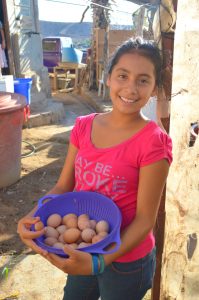
Clarisa
The Conscious Cooking program aims to change all that by making healthy foods affordable, desirable and an integral part of family life. And it was the desire to procure organic, pesticide-free produce at a reasonable price that drove SINADES and the women of the Conscious Cooking program to start building greenhouses. As Margarita Vasquez, one of the women in the group explains, “The older people in Pescadero used to grow their own food, but we lost all those skills. Now with SINADES and the greenhouse project we’re recovering those values. Through this program we’ve learned how to make our own organic fertilizer by composting, we’ve learned about watering our plants using gray waters from the house for irrigation, we’ve learned great skills like how to make nutritious snacks by drying fruit in the sun and so much more. We have learned such an incredible amount here about how to have healthy food at a low cost, and the impact on our personal health and that of our families has been remarkable.” Janette Albañez, who has lived in Pescadero for 25 years agrees. “Health, health, health is what this program means for me. I used to have chronic asthma and ate very poorly. Now my asthma has cleared up and even my junk-food guzzling husband loves eating raw vegetables.”
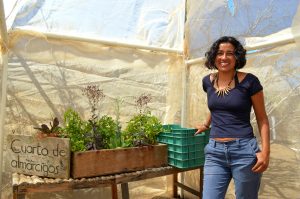
Ines Melchor Pantoja
Janette got involved when she saw one of her neighbors building a greenhouse, and this is the type of knock-on effect that the SINADES program is having in Pescadero. As more people see the health benefits that their friends and neighbors are achieving, the more that are interested in learning the skills to achieve similar results for themselves. And even more than for themselves, they are motivated on behalf of their children. Angeles Caballero, mother to two children ages 3 and 7, really speaks for all the women involved when she says “I started this program because of my kids. I’ve only been in Pescadero 10 years and was so surprised to see all the young children here that already have diabetes. I was motivated to save my children from this fate, but now my kids are even more motivated than me. Their friends think it’s weird that they’ll have tomatoes with salt instead of potato chips, but they don’t care. My kids love working in the garden and love this program. It is wonderful for us as a family.”
Areli couldn’t agree more. “My children are actually even more excited about the greenhouse than I am. They love coming out here and working every day. They love that we no longer buy any canned food, and they love how much better they feel with so much less junk food in their diet. These are benefits that you just can’t put a price on.”
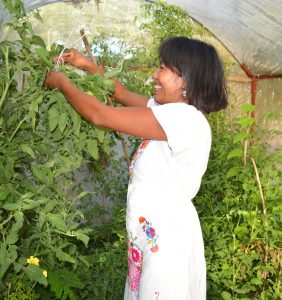 But there is a price of course, and the 4,000 pesos (~US$285) required to build a greenhouse is a fairly high barrier to entry for many of these families, a barrier that they must surmount once again as Hurricane Odile (September 2014) destroyed every one of the greenhouses built by the women and children of SINADES in Pescadero. But they are not discouraged. Says Inés, “We recovered some of the material from the greenhouses and received a small donation to buy more mesh, so we are slowly coming back around. Some of the families are already in production again and everyone is continuing to move forward. It’s a strong community and we will rebound.”
But there is a price of course, and the 4,000 pesos (~US$285) required to build a greenhouse is a fairly high barrier to entry for many of these families, a barrier that they must surmount once again as Hurricane Odile (September 2014) destroyed every one of the greenhouses built by the women and children of SINADES in Pescadero. But they are not discouraged. Says Inés, “We recovered some of the material from the greenhouses and received a small donation to buy more mesh, so we are slowly coming back around. Some of the families are already in production again and everyone is continuing to move forward. It’s a strong community and we will rebound.”
Before the hurricane, there were signs around the Pescadero community center that read “Cue da-temba, nuestra casa”. Cue da-temba means Mother Earth in the language of the Guaycura Indians, the now extinct indigenous people of Baja California Sur. And of course nuestra casa is Spanish for “our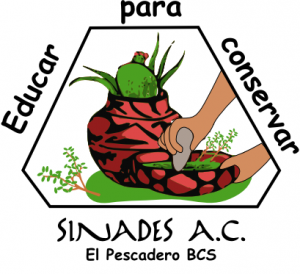 home”. The goal of Inés, Julio and the women and children of SINADES is to create a sustainable and healthy lifestyle for the families in their community. Helping them to do that is really just enlightened self interest because, after all, “Cue da-temba, nuestra casa” applies to us all. Inés can be reached at and the SINADES Facebook page is https://www.facebook.com/SinadesAc.
home”. The goal of Inés, Julio and the women and children of SINADES is to create a sustainable and healthy lifestyle for the families in their community. Helping them to do that is really just enlightened self interest because, after all, “Cue da-temba, nuestra casa” applies to us all. Inés can be reached at and the SINADES Facebook page is https://www.facebook.com/SinadesAc.
*Fasol, headed by the dynamic Artemisa Castro and a group of likeminded environmental activists, provides financial support to grassroots groups that are working for social and environmental change in Mexico. SINADES is a great example of the type of success they have achieved in communities across Mexico. For more information please visit their web site at: http://fasol-ac.org/fasol_wp_ing/
This article first appeared in Janice Kinne’s Journal del Pacifico
© Copyright Sergio and Bryan Jauregui, Casa Payaso S de RL de CV, 2015
